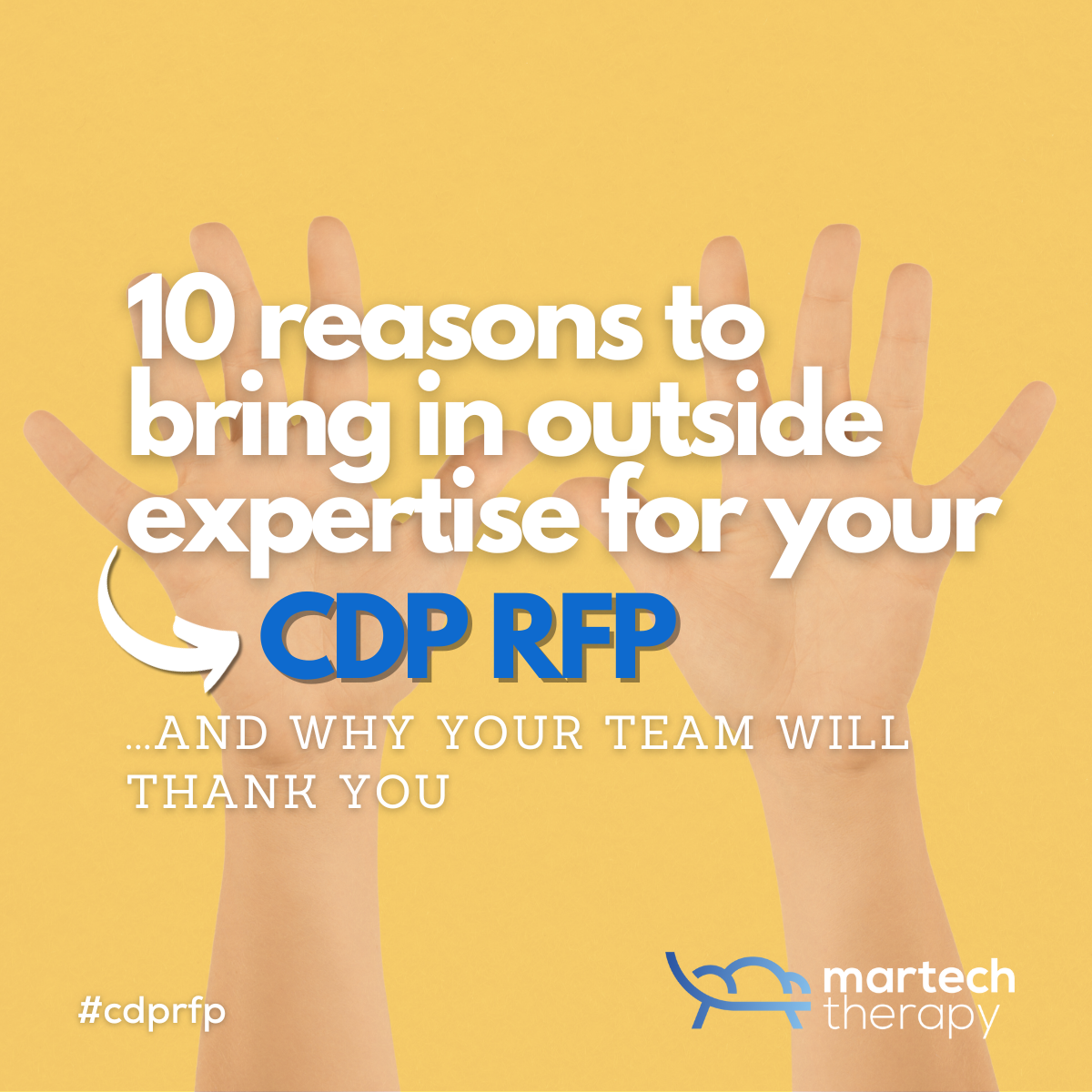I’ll be honest, I usually dislike “top ten” style articles. They tend to oversimplify complex decisions and make it sound like ticking boxes will magically solve everything. But after publishing my last three pieces, on dating vendors, reference calls, and surviving the RFP process, I kept hearing the same question: why bring in outside help at all?
So, against my better instincts, here’s a list. Not because every company will face all ten of these issues, but because most will recognize at least a few of them. And if even one sounds true to you, it might be the sign that your team doesn’t need another tool. It needs support to pick the right one.
Protecting the business
Risk
A CDP purchase looks straightforward on paper, but in reality it’s a high-stakes decision. If the tool underdelivers, you don’t just lose budget, you also lose momentum, and explaining that to leadership or the board is never a pleasant experience. An independent guide can’t guarantee success, but they can help you avoid the most common pitfalls that lead to regret.
Money
Pricing models in this space are rarely as clear as they first appear. A contract might look reasonable in the demo stage, only for costs to balloon later through data point creep, API usage limits, monthly tracked users, active/passive profiles, or premium support tiers. Business leaders don’t mind paying for value, but they do mind nasty surprises. External expertise helps expose those surprises early, so the choice you make is one you can stand behind months down the line.
Supporting your people
Pressure on internal teams
Even when budgets are available, the real strain often shows up inside the team. Marketers are already expected to deliver more campaigns with fewer resources. Engineers are balancing backlogs that never shrink. Asking them to also run a complex RFP is like handing them a second job, and one they didn’t ask for. External support lifts that weight so the team can stay focused on delivering value instead of drowning in vendor paperwork.
Trust
In a market full of look-a-likes and bare-knuckle marketing, a neutral voice gives teams confidence that the evaluation is fair. Instead of being pulled back and forth by sales spin or agency agendas, they can focus on the criteria that actually matter. It doesn’t mean outside help replaces internal knowledge, far from it. It means that knowledge is better protected and put to use, and not drowned out by vendor-made promises.
Getting it right the first time
Detail
What trips up many RFPs isn’t the big questions like “does it perform identity stitching” or “can I ingest data from Azure”, it’s the finer details. Contracts, permissions, integrations, service levels, the things that feel small in the moment but turn into costly blockers later. External expertise brings a kind of muscle memory to these details, making sure the i’s are dotted and the t’s are crossed before they become problems that need workarounds like you previously succumbed to.
Experience
Most teams only go through a CDP selection once or twice in their career. That means they’re learning the hard way as they go. An advisor who has seen dozens of these cycles can spot patterns quickly. Patterns such as which vendors overpromise, which roadmaps are reliable, and which traps tend to show up in year two. That perspective helps a team avoid repeating mistakes others have already made.
Translation
For many leaders, CDPs still feel like a fog of acronyms and bundles. External support cuts through that by putting technology into plain language. What it does, how it maps to your use cases, and whether it’s worth the investment. That “translation” lets teams and executives have the same conversation, instead of speaking past one another.
Playing the market
Leverage
Every RFP plays out against a backdrop of market dynamics. Vendors are under pressure to adjust pricing models, and buyers finally have leverage. Knowing what’s happening beyond your own negotiation, how other companies are paying, what “good” deals look like, which models are shifting, puts you in a stronger position. That perspective is hard to gain from the inside, but it’s exactly what external expertise brings to the table.
Flexibility
Hiring full-time staff to run procurement or manage selection isn’t realistic for most companies. External support is project-based. You get the skills when you need them, without the long-term cost of salaries, benefits, or training. That makes it easier to move at the speed the business demands, without adding overhead you’ll be stuck with later.
Alignment
A strong external lead helps bring the right people inside your company together. Marketing, engineering, analytics, compliance, all of them have stakes in a CDP decision, and all of them can block progress if their needs are ignored. An independent facilitator makes sure every voice is heard, turning what could be a tug-of-war into a decision the whole organization can stand behind.
Why outside help matters now
When you look across these ten reasons, a pattern emerges. It’s not just about contracts or compliance. It’s about protecting the business from regret, protecting your people from overload, making decisions that stand up under scrutiny, and using the market to your advantage.
That’s why companies bring in outside help. It is not because they can’t run an RFP, but because they can’t afford to get it wrong. An independent lead brings perspective, structure, and experience that saves money, saves time, and saves teams from the kind of mistakes that don’t show up until it’s too late.
This is the work I do. If your team is preparing for a CDP or CEP decision, and you want the process to be fair, thorough, and built around your use cases, get in touch.
The tools will keep changing.
The stakes will keep rising.
What doesn’t change is the need for someone in your corner.
Or subscribe to my Substack and stay up to date on all things Martech 👇🏻



Discussion